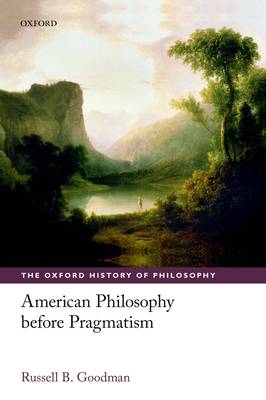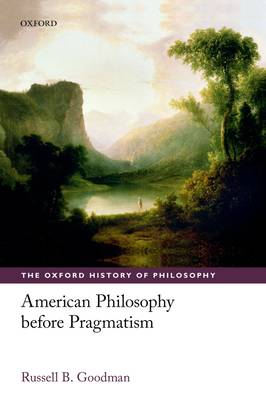
- Retrait gratuit dans votre magasin Club
- 7.000.000 titres dans notre catalogue
- Payer en toute sécurité
- Toujours un magasin près de chez vous
- Retrait gratuit dans votre magasin Club
- 7.000.0000 titres dans notre catalogue
- Payer en toute sécurité
- Toujours un magasin près de chez vous
Description
Russell B. Goodman tells the story of the development of philosophy in America from the mid-18th century to the late 19th century. The key figures in this story, Jonathan Edwards, Benjamin Franklin, Thomas Jefferson, the writers of The Federalist, and the romantics (or 'transcendentalists') Emerson and Thoreau, were not professors but men of the world, whose deep formative influence on American thought brought philosophy together with religion, politics, and literature. Goodman considers their work in relation to the philosophers and other thinkers they found important: the deism of John Toland and Matthew Tindal, the moral sense theories of Francis Hutcheson, Adam Smith, and David Hume, the political and religious philosophy of John Locke, the romanticism of William Wordsworth and Samuel Taylor Coleridge, and the transcendental idealism of Immanuel Kant. Goodman discusses Edwards's condemnation and Franklin's acceptance of deism, argues that Jefferson was an Epicurean in his
metaphysical views and a Christian, Stoic, and Epicurean in his moral outlook, traces Emerson's debts to writers from Madame de Stael to William Ellery Channing, and considers Thoreau's orientation to the universe through sitting and walking. The morality of American slavery is a major theme in American Philosophy before Pragmatism, introduced not to excuse or condemn, but to study how five formidably intelligent people thought about the question when it was--as it no longer is for us--open. Edwards, Franklin and Jefferson owned slaves, though Franklin and Jefferson played important roles in disturbing the uneasy American moral equilibrium that included slavery, even as they approved an American constitution that included it. Emerson and Thoreau were prominent public opponents of slavery in the eighteen forties and fifties. The book contains an Interlude on the concept of a republic and concludes with an Epilogue documenting some continuities in American philosophy, particularly between Emerson and the pragmatists.
metaphysical views and a Christian, Stoic, and Epicurean in his moral outlook, traces Emerson's debts to writers from Madame de Stael to William Ellery Channing, and considers Thoreau's orientation to the universe through sitting and walking. The morality of American slavery is a major theme in American Philosophy before Pragmatism, introduced not to excuse or condemn, but to study how five formidably intelligent people thought about the question when it was--as it no longer is for us--open. Edwards, Franklin and Jefferson owned slaves, though Franklin and Jefferson played important roles in disturbing the uneasy American moral equilibrium that included slavery, even as they approved an American constitution that included it. Emerson and Thoreau were prominent public opponents of slavery in the eighteen forties and fifties. The book contains an Interlude on the concept of a republic and concludes with an Epilogue documenting some continuities in American philosophy, particularly between Emerson and the pragmatists.
Spécifications
Parties prenantes
- Auteur(s) :
- Editeur:
Contenu
- Nombre de pages :
- 304
- Langue:
- Anglais
- Collection :
Caractéristiques
- EAN:
- 9780198801535
- Date de parution :
- 11-03-18
- Format:
- Livre broché
- Format numérique:
- Trade paperback (VS)
- Dimensions :
- 231 mm x 155 mm
- Poids :
- 476 g

Les avis
Nous publions uniquement les avis qui respectent les conditions requises. Consultez nos conditions pour les avis.






